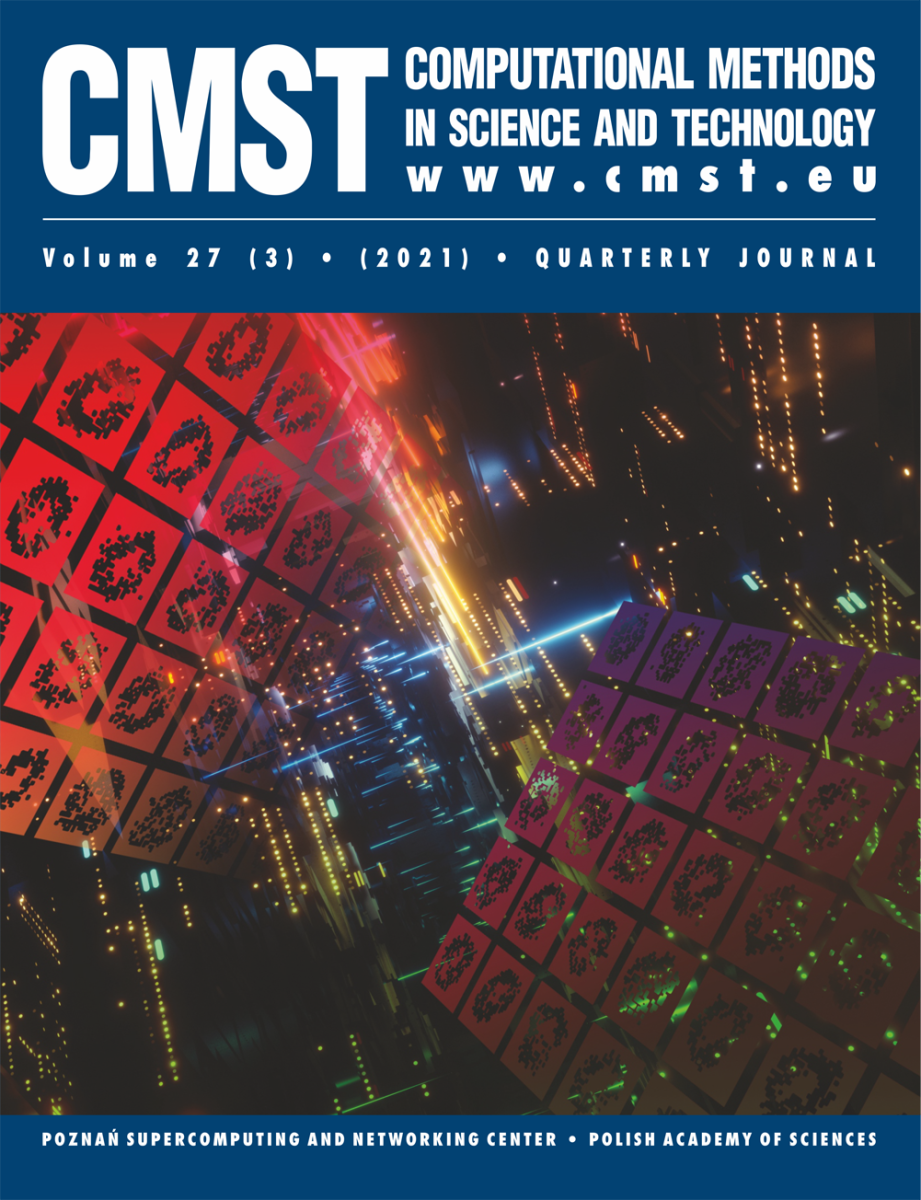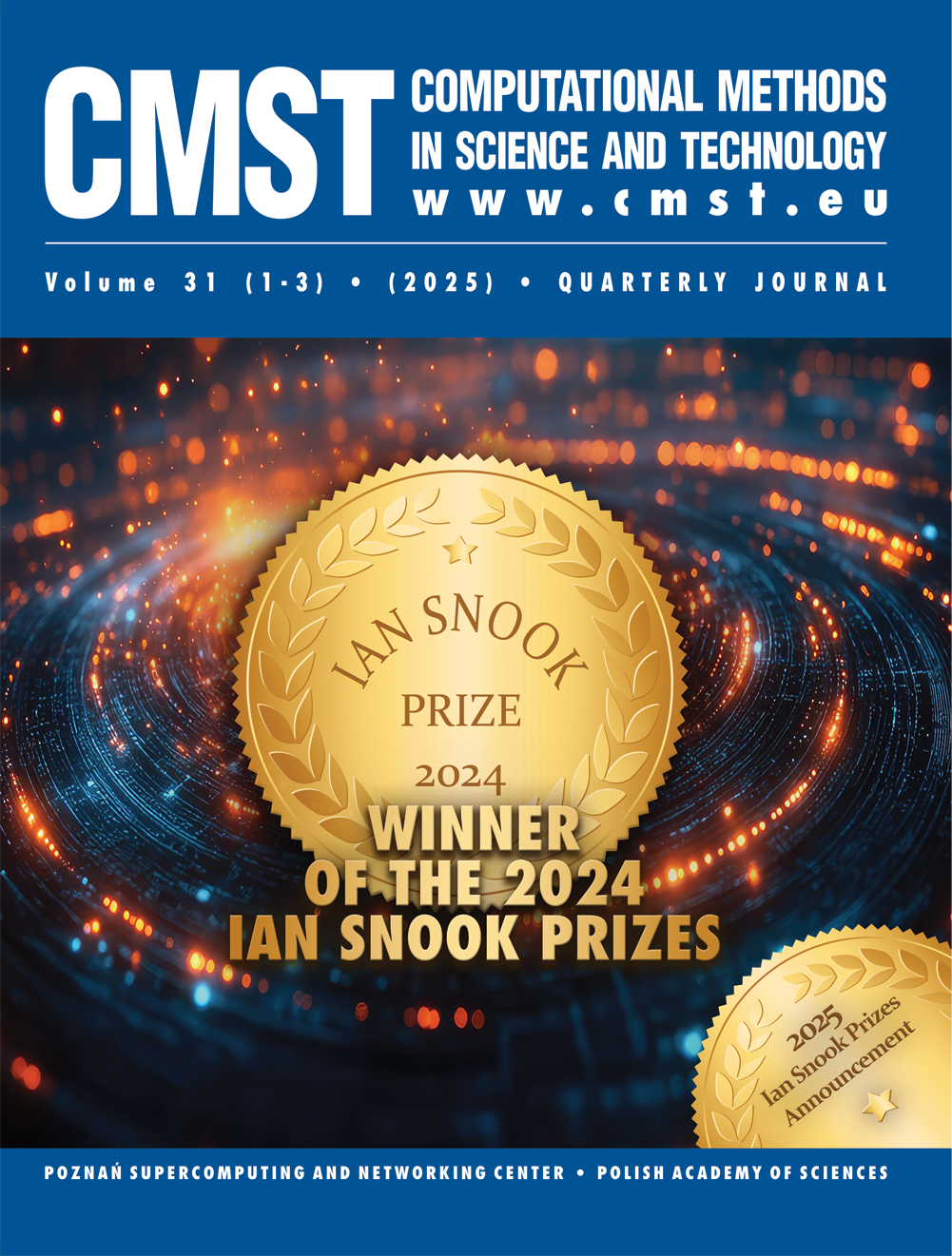Study of memory effect in an economic order quantity model with quadratic type demand rate
Pakhira Rituparna 1, Ghosh Uttam 2, Sarkar Susmita 3
University of Calcutta
Department of Applied Mathematics
Kolkata, 700009
West Bengal, India1 E-mail: rituparna.pakhira@gmail.com
2 E-mail: uttam_math@yahoo.co.in
3 E-mail: susmita62@yahoo.co.in
Received:
Received: 10 February 2019; revised: 07 June 2019; accepted: 10 June 2019; published online: 24 June 2019
DOI: 10.12921/cmst.2019.0000004
Abstract:
The study of memory effect in an economic order quantity model has a great impact on the inventory system. Although business policy almost depends on the past experiences of the system, usually the classical inventory model does not include the past experience or memory effect, i.e. one important part of the system is ignored. Our purpose is to include memory or past experience in the inventory model. The purpose of this paper is to incorporate the existence of dynamic memory in an inventory model with shortage via fractional calculus. To derive the memory dependent inventory model associated with inventory holding cost, shortage cost has been developed. Analytical solution of the proposed inventory model has been solved via primal geometric programming method. Numerically long memory effect or short memory effect of the inventory system has been established. In this paper, an effort has also been made to compare the memory effect on the minimized total average cost and the optimal ordering interval using different numerical examples.
Key words:
classical inventory model, differential equation with memory kernel, fractional Laplace transforms method, memory dependent Inventory model
References:
[1] M. Saeedian, M. Khalighi, N. Azimi-Tafreshi, G.R. Jafari, M. Ausloos, Memory effects on epidemic evolution: The susceptible-infected-recovered epidemic model, Physical Review E 95, 022409 (2017).
[2] V.V. Tarasova, V.E. Tarasov, Memory effects in hereditary Keynesian model, Problems of Modern Science and Education 38(80), 38–44 (2016). DOI: 10.20861/2304-2338-2016-80-001 [in Russian].
[3] V.E. Tarasov, V.V. Tarasova, Long and short memory in economics: fractional-order difference and differentiation, IRAInternational Journal of Management and Social Sciences 5(2), 327–334 (2016). DOI: 10.21013/jmss.v5.n2.p10.
[4] V.E. Tarasov, V.V. Tarasova, Economic interpretation of fractional derivatives, Progress in Fractional Differential and Applications 3(1), 1–6 (2017).
[5] V.E. Tarasov, V.V. Tarasova, Elasticity for economic processes with memory: fractional differential calculus approach, Fractional Differential Calculus 6(2), 219–232 (2016).
[6] R. Pakhira, U. Ghosh, S. Sarkar, Study of Memory Effects in an Inventory Model Using Fractional Calculus, Applied Mathematical Sciences 12(17), 797–824 (2018).
[7] R. Pakhira, U. Ghosh, S. Sarkar, Application of Memory effects In an Inventory Model with Linear Demand and No shortage, International Journal of Research in Advent Technology 6(8) (2018).
[8] T. Das, U. Ghosh, S. Sarkar, S. Das, Time independent fractional Schrodinger equation for generalized Mie-type potential in higher dimension framed with Jumarie type fractional derivative, Journal of Mathematical Physics 59, 022111 (2018). DOI: 10.1063/1.4999262.
[9] K.S. Miller, B. Ross, An Introduction to the Fractional Calculus and Fractional Differential Equations, John Wiley & Sons, New York, USA (1993).
[10] I. Podubly, Fractional Differential Equations, Mathematics in Science and Engineering, Academic Press, San Diego, California, USA (1999).
[11] F.W. Harris, Operations and Cost, 48–54, A. W. Shaw Company, Chicago (1915).
[12] R.H.Wilson, A Scientific Routine for Stock Control, Harvard Business Review 13(1), 116–128 (1934).
[13] N. Rajeswari, T. Vanjikkodi, An Inventory model for Items with Two Parameter Weibull Distribution Deterioration and Backlogging, American Journal of Operations Research 2, 247–252 (2012).
[14] E.A. Silver, A Simple inventory replenishment decision rule for a linear trend in demand, Journal of the Operational Research Society 30, 71–75 (1979).
[15] M. Deb, K. Chaudhuri, A note on the heuristic for replenishment of trended inventories considering shortages, J. Oper. Research Soc. 38, 459–463 (1987).
[16] E. Ritchie, The optimal EOQ for linear increasing demand: a simple optimal solution, Journal of the Operational Research Society 35, 949–952 (1984).
[17] U. Ghosh, S. Sengupta, S. Sarkar, S. Das, Characterization of non-differentiable points of a function by Fractional derivative of Jumarie type, European Journal of Academic Essays 2(2), 70–86 (2015).
[18] U. Ghosh, S. Sengupta, S. Sarka, S. Das, Analytic Solution of linear fractional differential equation with Jumarie derivative in term of Mittag-Leffler function, American Journal of Mathematical Analysis 3(2), 32–38 (2015).
[19] S. Das, Functional Fractional Calculus for system Identification and Controls, Springer, Berlin, Heidelberg, New York (2008).
[20] A.K. Ojha, K.K. Biswal, Posynomial Geometric Programming Problems with Multiple parameters, Journal of Computing 2(1) (2010).
[21] R. Pakhira, U. Ghosh, S. Sarkar, Study of Memory Effect in an Inventory Model with Linear Demand and Salvage Value, International Journal of Applied Engineering Research 13(20), 14741–14751 (2018).
[22] R. Pakhira, U. Ghosh, S. Sarkar, Study of Memory Effect in Inventory Model with Quadratic Type Demand Rate and Salvage Value, Applied Mathematical Sciences 13(5), 209–223 (2019). DOI: 10.12988/ams.2019.9111.
[23] R. Pakhira, U. Ghosh, S. Sarkar, Study of Memory Effect In an Inventory Model with Linear Demand and Shortage, International Journal of Mathematical Sciences and Computing (IJMSC) (2019).
[24] R. Pakhira, U. Ghosh, S. Sarkar, Application of memory effect in an inventory model with price dependent demand rate during shortage, I.J. Education and Management Engineering (2019).
The study of memory effect in an economic order quantity model has a great impact on the inventory system. Although business policy almost depends on the past experiences of the system, usually the classical inventory model does not include the past experience or memory effect, i.e. one important part of the system is ignored. Our purpose is to include memory or past experience in the inventory model. The purpose of this paper is to incorporate the existence of dynamic memory in an inventory model with shortage via fractional calculus. To derive the memory dependent inventory model associated with inventory holding cost, shortage cost has been developed. Analytical solution of the proposed inventory model has been solved via primal geometric programming method. Numerically long memory effect or short memory effect of the inventory system has been established. In this paper, an effort has also been made to compare the memory effect on the minimized total average cost and the optimal ordering interval using different numerical examples.
Key words:
classical inventory model, differential equation with memory kernel, fractional Laplace transforms method, memory dependent Inventory model
References:
[1] M. Saeedian, M. Khalighi, N. Azimi-Tafreshi, G.R. Jafari, M. Ausloos, Memory effects on epidemic evolution: The susceptible-infected-recovered epidemic model, Physical Review E 95, 022409 (2017).
[2] V.V. Tarasova, V.E. Tarasov, Memory effects in hereditary Keynesian model, Problems of Modern Science and Education 38(80), 38–44 (2016). DOI: 10.20861/2304-2338-2016-80-001 [in Russian].
[3] V.E. Tarasov, V.V. Tarasova, Long and short memory in economics: fractional-order difference and differentiation, IRAInternational Journal of Management and Social Sciences 5(2), 327–334 (2016). DOI: 10.21013/jmss.v5.n2.p10.
[4] V.E. Tarasov, V.V. Tarasova, Economic interpretation of fractional derivatives, Progress in Fractional Differential and Applications 3(1), 1–6 (2017).
[5] V.E. Tarasov, V.V. Tarasova, Elasticity for economic processes with memory: fractional differential calculus approach, Fractional Differential Calculus 6(2), 219–232 (2016).
[6] R. Pakhira, U. Ghosh, S. Sarkar, Study of Memory Effects in an Inventory Model Using Fractional Calculus, Applied Mathematical Sciences 12(17), 797–824 (2018).
[7] R. Pakhira, U. Ghosh, S. Sarkar, Application of Memory effects In an Inventory Model with Linear Demand and No shortage, International Journal of Research in Advent Technology 6(8) (2018).
[8] T. Das, U. Ghosh, S. Sarkar, S. Das, Time independent fractional Schrodinger equation for generalized Mie-type potential in higher dimension framed with Jumarie type fractional derivative, Journal of Mathematical Physics 59, 022111 (2018). DOI: 10.1063/1.4999262.
[9] K.S. Miller, B. Ross, An Introduction to the Fractional Calculus and Fractional Differential Equations, John Wiley & Sons, New York, USA (1993).
[10] I. Podubly, Fractional Differential Equations, Mathematics in Science and Engineering, Academic Press, San Diego, California, USA (1999).
[11] F.W. Harris, Operations and Cost, 48–54, A. W. Shaw Company, Chicago (1915).
[12] R.H.Wilson, A Scientific Routine for Stock Control, Harvard Business Review 13(1), 116–128 (1934).
[13] N. Rajeswari, T. Vanjikkodi, An Inventory model for Items with Two Parameter Weibull Distribution Deterioration and Backlogging, American Journal of Operations Research 2, 247–252 (2012).
[14] E.A. Silver, A Simple inventory replenishment decision rule for a linear trend in demand, Journal of the Operational Research Society 30, 71–75 (1979).
[15] M. Deb, K. Chaudhuri, A note on the heuristic for replenishment of trended inventories considering shortages, J. Oper. Research Soc. 38, 459–463 (1987).
[16] E. Ritchie, The optimal EOQ for linear increasing demand: a simple optimal solution, Journal of the Operational Research Society 35, 949–952 (1984).
[17] U. Ghosh, S. Sengupta, S. Sarkar, S. Das, Characterization of non-differentiable points of a function by Fractional derivative of Jumarie type, European Journal of Academic Essays 2(2), 70–86 (2015).
[18] U. Ghosh, S. Sengupta, S. Sarka, S. Das, Analytic Solution of linear fractional differential equation with Jumarie derivative in term of Mittag-Leffler function, American Journal of Mathematical Analysis 3(2), 32–38 (2015).
[19] S. Das, Functional Fractional Calculus for system Identification and Controls, Springer, Berlin, Heidelberg, New York (2008).
[20] A.K. Ojha, K.K. Biswal, Posynomial Geometric Programming Problems with Multiple parameters, Journal of Computing 2(1) (2010).
[21] R. Pakhira, U. Ghosh, S. Sarkar, Study of Memory Effect in an Inventory Model with Linear Demand and Salvage Value, International Journal of Applied Engineering Research 13(20), 14741–14751 (2018).
[22] R. Pakhira, U. Ghosh, S. Sarkar, Study of Memory Effect in Inventory Model with Quadratic Type Demand Rate and Salvage Value, Applied Mathematical Sciences 13(5), 209–223 (2019). DOI: 10.12988/ams.2019.9111.
[23] R. Pakhira, U. Ghosh, S. Sarkar, Study of Memory Effect In an Inventory Model with Linear Demand and Shortage, International Journal of Mathematical Sciences and Computing (IJMSC) (2019).
[24] R. Pakhira, U. Ghosh, S. Sarkar, Application of memory effect in an inventory model with price dependent demand rate during shortage, I.J. Education and Management Engineering (2019).

